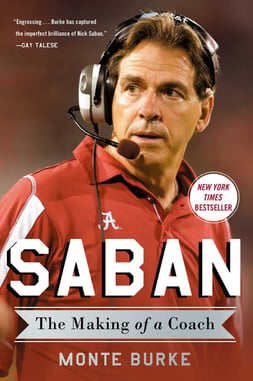
A Lesson on Resiliency and Process
Categories: Sales Productivity
There have been so many times in my life when I’ve admired the resiliency in others. The ability to recover quickly despite loss, hardship, or other difficulties is no easy feat. The quality is not to be underestimated. This past year showed me my own resiliency.
2017 was a difficult year for me. I experienced personal loss of family and friends which took the wind out of my sails. Even in their final days, each of these people stood in the face of incredible pain and their own mortality. It was so admirable and forced me to reflect on my own resiliency.
I asked myself, “How resilient are you?”
I didn’t necessarily have an answer and still don’t, but have found some clarity in reflecting on the topic recently.
 This past holiday, I had some rare time to relax and read. I had a book on my Kindle that I had been meaning to read but never got around to it. The first book was, Saban: The Making of a Coach by Monte Burke. It was a terrific read on Alabama Coach Nick Saban. I could not get enough so I read Saban's own book, How Good Do You Want to Be? A Champion's Tips on How to Lead and Succeed at Work and in Life.
This past holiday, I had some rare time to relax and read. I had a book on my Kindle that I had been meaning to read but never got around to it. The first book was, Saban: The Making of a Coach by Monte Burke. It was a terrific read on Alabama Coach Nick Saban. I could not get enough so I read Saban's own book, How Good Do You Want to Be? A Champion's Tips on How to Lead and Succeed at Work and in Life.
After reading these books, I was even more interested in the NCAA Football Championship. I had always planned to watch the game, but I wanted to see if these were just words on paper or principles in action.
As Georgia dominated the first half, I smiled to myself as social media lit up with disparaging comments about Nick Saban and his process.
There’s nothing I love more than a process that works. I’m passionate about Saban’s approach because I feel it is a great example of how to be your best self. It also aligns tightly with what we teach as part of our Command series, specifically Command of the Message®.
The Process
Saban often speaks about, “the process.” His basic philosophy is that the focus on the process should be more than the focus on the outcome. It begins with an organizational mindset which he calls "the vision." Saban gets his team to focus on the things that will deliver on the “the vision."
With six national championships, one would think he would have his teams focus on winning national championships. However, for Saban, it’s quite the opposite. He focuses his teams on the little things it takes to put yourself in a position to win the National Championship. Daily discipline always underscores the process.
I pulled up one of Saban's motivational speeches on YouTube and found some great quotes on his process. Saban sums up discipline perfectly this way, “There are some things that you are supposed to do but you don’t want to do them – So we do them. There are some things that you are not supposed to do but you want to do them – So we don’t do them.”
How many times do you begrudgingly put the rigor behind your sales discipline? It’s those things that we don’t necessarily like to do, that often make us successful at the end of the quarter. Sales planning, deal qualification, testing our champions – it’s not easy, but the reward is no doubt greater if we execute these fundamentals.
Saban’s point is that you will never achieve your vision if you do not commit to the process with discipline of execution. He makes this clearer to his team by saying, “You have a choice. You are going to do what you feel like doing or you are going to do the things necessary to accomplish the goal and the vision we have.”
Do what’s necessary to achieve and exceed your number.
Adversity and Grit
 Another critical point in Saban’s leadership message is dealing with adversity. Everyone is going to face hardship and adversity in life, but for Saban it’s the process that helps you deal with it. He says, "Are you able to stay focused on the process and the vision? Or, are you only able to focus on your circumstance?” This focus is what he calls resilience.
Another critical point in Saban’s leadership message is dealing with adversity. Everyone is going to face hardship and adversity in life, but for Saban it’s the process that helps you deal with it. He says, "Are you able to stay focused on the process and the vision? Or, are you only able to focus on your circumstance?” This focus is what he calls resilience.
You may have heard this described in a similar way by best-selling, author and professor of psychology at the University of Pennsylvania, Dr. Angela Duckworth. Duckworth describes it as “Grit,” a positive, non-cognitive trait based on an individual's passion for a particular long-term goal or end state, coupled with a powerful motivation to achieve their respective objective. This perseverance of effort promotes the overcoming of obstacles or challenges that lie on paths to accomplishment, and serves as a driving force in achievement realization. The data supporting this premise is amazingly convincing and I’ve seen it myself after working with countless sales organizations.
People who succeed in sales and sales leadership, focus on the process and the end-game. They have grit. They’re not afraid to say no to opportunities that aren’t the right fit and they know how to push through obstacles to see a goal to fruition.
People and Relationships
We often talk about the importance of hiring people who know how to execute within the rigors of your organization. You can’t succeed if you don’t have the right people in place. It’s no surprise that Saban’s process demands a maniacal focus on people and relationships.
I often refer to this Saban quote: “Mediocre people don’t like high achievers and high achievers don’t like mediocre people – so don’t mix them!” Saban’s talent process focuses on “defining everyone’s role specifically” and then getting them to commit to, “just do your job” [a likely ode to his former boss Bill Belichick]. Is there a clearer parallel to sales? Define what you want your sales people to do. Show them how to do it. Enable them to do their job.
There’s No End to Success
The last part of Saban’s process fittingly focuses on continued success. Under Saban, Alabama has won five national titles and played in six. I would call that continued success. Saban defines success as, “consistency of performance,” steering clear of complacency.
In his speech, Saban says, “As soon as we get some success we want to relax. It is human nature to begin to create a blatant disregard for doing the right things that got you to your success. You start to resent these things that made you successful.”
Man, how true is that? I look at myself and all the things that have helped make Force Management what it is today. Some of those same things can feel like a burden if I get complacent. It’s the same with sales. You blew 2017 out of the water. Don’t rest on your laurels. You’re already two weeks into a new quarter.
Saban believes strongly that success is momentary. This is why he has a 24-hour-rule. He allows himself, his team and his coaching staff 24 hours to either enjoy a victory or contemplate a defeat. Then, they move on to the next goal. He summed it up perfectly the day after the championship game. “We have allowed our program to take 24 hours to really enjoy this win and celebrate, then we are going back to work. What comes with winning like we do, is a bigger target on our back every year.”
He knows that those Georgia players that stayed around to watch the confetti fall on the field, burned that image of the trophy ceremony on their minds. Who will hit the gym harder this week, Georgia or Alabama? #letsjustsee
The National Championship
As I reflected on these concepts after the National Championship game, there was so much evidence of why following the process leads to success. Consider the evidence:
Resiliency
- Alabama outscored Georgia 20-7 in the second half and and won the game in OT 26-23.
- Backup QB Tua Tagovailo steps up and throws a walk-off, 41-yard strike after previously losing 15 yards on a very poorly executed play.
- One team focused methodically on the “next play” and the other seemed to tighten up and wear down as the game went on (no disrespect to Georgia, I think they had an amazing year and they will be good for years to come).
The Process
- Alabama was down by 13 points at the half and Georgia’s run defense was swarming. Saban knew immediately he would have to adjust the game plan by improving the passing game. He went into the locker room compassionately told the starting QB Jalen Hurts that they were going to make a switch because the game plan needed it to happen. If you did not get the chance, look on the internet and find the post-game interviews with Jalen. Most of the media outlets were looking for controversy and expecting this 20-year-old student athlete to lash out. What was his response to being replaced? “Tua was purpose built for tonight."
- You may not have noticed another subtle change at the end of the game. Freshman running back Najee Harris came into the game. He had not taken a snap, but he is 6"2' 227 lbs with fresh legs and a bruising running style. This was too much for the talented, but exhausted Georgia defense to handle.
- The first touchdown from Tua was just as amazing as his last. When I went back and watched that play in slow motion, it was clear that Tua was throwing to a spot in the end zone where the receiver was supposed to be. What was most amazing to me was that there was another receiver in the area directly behind this spot. I watched the play over and over and asked myself, “How did he have the discipline not to go for that ball when it looked like it was being thrown directly to him?” If he had made a play for it, he may have collided with the intended receiver and no one would have caught it. The answer is simple, he knew his role and did his job.
Recruiting and Talent
- Wow, this was one of the strongest pieces of evidence for me during this game. The final play of the game was a touchdown from a true freshmen to a true freshman. Prior to this play, the Georgia defense was pummeled by another true freshman. Saban knows how to recruit and he knows how to coach talent to do their jobs.
- I have been studying Saban for the last few months so I am eager to speak with my friends about what I am seeing. It is amazing to me how many people say to me, “Yeah, but the reason Saban wins is because he has the best players,” or “How successful would Belichick be without Tom Brady?”. My answer is always the same question, “What’s your point?”
In summary, I hope you enjoyed the National Championship game as much as I did. There were so many great non-football lessons. Take time this new year and ask yourself these questions:
- How resilient am I? How resilient is my team? Based on what? Am I a relentless competitor who will overcome adversity to achieve my goal? If not why not?
- Do I understand exactly what my role is? Do I know exactly what it takes to be successful in my role? Am I disciplined to do what it takes to be successful in my role? Am I doing my job? If not why not?
- Am I diligent in focusing on the process? Am I doing the important steps along the way in order to achieve the ultimate goal?


